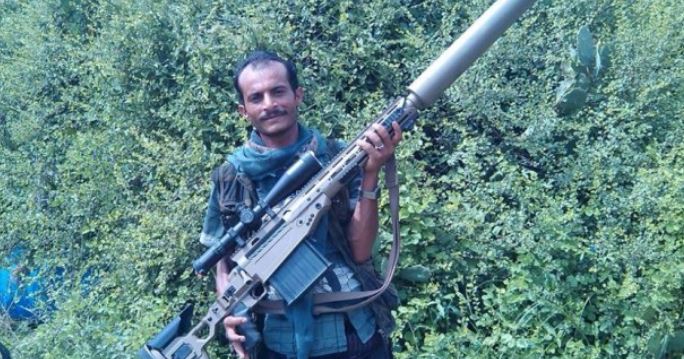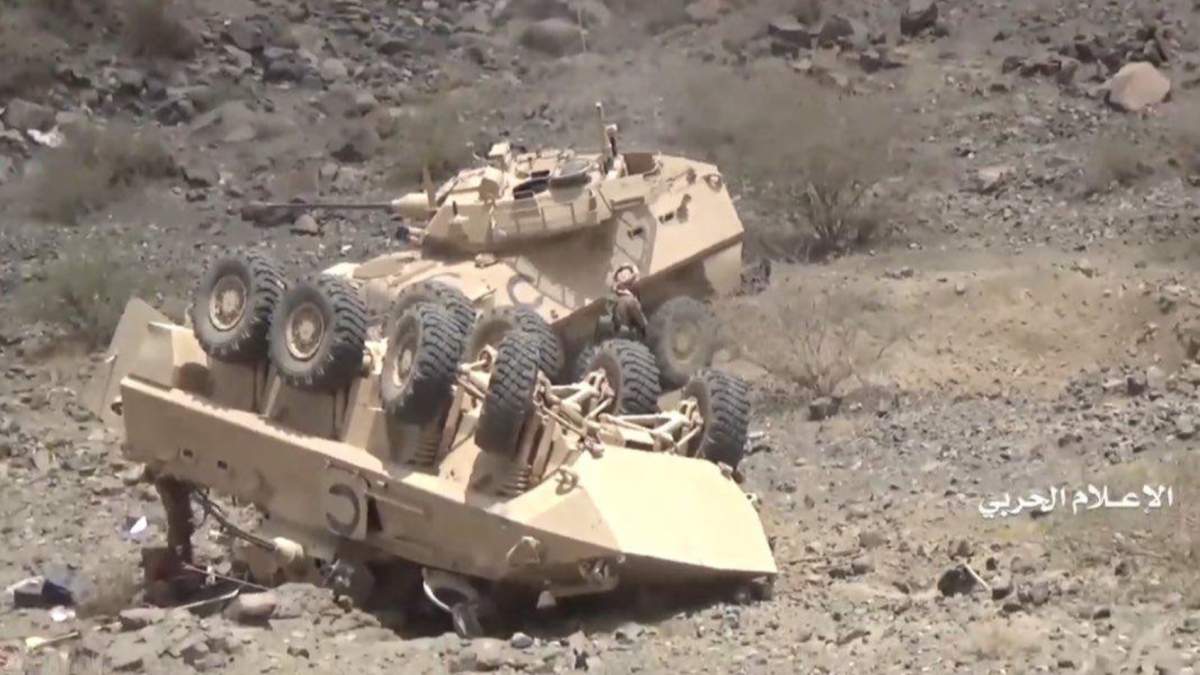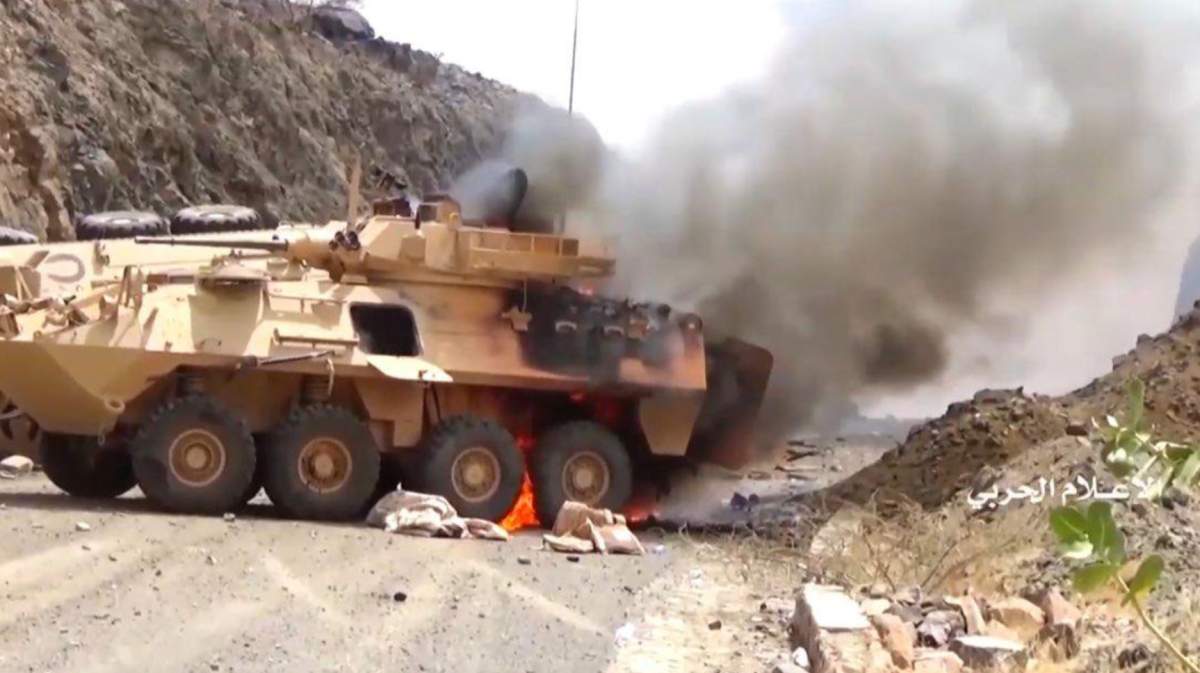Canada claims it has found no evidence linking its military exports to human rights violations committed by Saudi Arabia, even after video and photos of Canadian military goods have appeared amid the Yemen conflict between the Saudi-led coalition and Houthi rebels.

“There is no substantial risk that current Canadian exports of military equipment or other controlled items to KSA would result in any of the negative consequences,” reads a memo from Global Affairs addressed to former foreign affairs minister Chrystia Freeland.
READ MORE: Global Affairs finds no ‘credible’ evidence linking Saudi arms sales to human rights abuses
Footage of Canadian-made light armoured vehicles (LAVs) has been captured over the last few years, as Saudi forces and Houthi rebels battle along the Saudi-Yemen border.
Last September, video from Houthi-run Al Masirah TV and Al Jazeera showed what appeared to be Canadian-made LAVs. Two independent military experts confirmed the images are Canadian-made combat vehicles.
Global News was not able to independently verify the video.
Arms control advocate Cesar Jaramillo said there is an overwhelming amount of evidence to show Canadian military exports are appearing in areas of the Kingdom and in Yemen, where human rights violations are occurring.
“It’s an exercise in willfull blindness,” said Jaramillo, executive director of Project Ploughshares.
“It’s like unless you see a weapon with a maple leaf killing civilians, there is complete unwillingness to recognize risk.”
Global Affairs did not immediately respond to questions about the memo or the recent images allegedly showing Canadian LAVs in Yemen. Doug Wilson-Hodge, spokesman for General Dynamics Land Systems-Canada, declined to comment on the videos.
The Trudeau government had announced a review of all Canada’s existing arms sales to Saudi Arabia in the fall of 2018, after reports emerged that the Saudi government was behind the murder of journalist Jamal Khashoggi.
The moratorium, however, did not affect the controversial $15-billion deal with the Kingdom to export more than 700 combat vehicles, produced by General Dynamics Land Systems-Canada at its plant in London, Ont.
The Trudeau government has faced sharped criticism over its continued support of the Saudi deal, as the country has a lengthy history of human rights violations that include unlawful killings, forced renditions, forced disappearances, and torture of detainees by government agents.

Get breaking National news
The memo also acknowledged that the Kingdom has been accused of “gross violations of international human rights and humanitarian law due to its role leading a military coalition in Yemen.”
The conflict in Yemen has seen thousands of civilians killed by Saudi-led coalition airstrikes and more than 24 million people in need of humanitarian aid.
Global Affairs said any reports of Canadian LAVs along the Saudi-Yemen border are irrelevant because those vehicles are from earlier export deals, not the current $15-billion agreement.

“Any Canadian-made vehicles on the KSA-Yemen border are not the LAVs currently being exported by GDLS-C, but older vehicles that were shipped under contracts dating back to the early 1990s,” the memo said.
However, Anthony Fenton, a PhD candidate in political science at York University who studies Saudi Arabia, said that part of the General Dyanimcs contract includes work to upgrade older LAV vehicles.
“There is a clear connection between the current $15-billion deal and the older vehicles shipped during the 90s,” Fenton said.
“Yemen is a heinous war… nobody should be shipping weapons to help fuel this conflict.”
According to Global Affairs Canada statistics, Saudi Arabia was the largest non-U.S. export destination in 2018, receiving roughly $1.2 billion in Canadian military goods.
The memo claimed there is no evidence Canadian weapons are being used to commit war crimes in Yemen.
“There is no evidence or credible reporting that would link any Canadian exports (eg. ground vehicles, sniper riles) to contraventions of international humanitarian law in Yemen,” the memo said.
In 2015, Armament Research Services, an international intelligence consultancy that traces arms, reported images of what appeared to be a Canadian-made sniper rifle in the hands of Houthi fighters.

ARES found that images taken from social media showed what appeared to be the LRT-3, a .50 calibre sniper rifle, made by Winnipeg-based PGW Defence Technologies.
“Precision sniper rifles are manufactured to a high standard, often in small batches and by smaller manufacturers,” ARES noted in its report.
“It is not uncommon for non-NATO states, including Saudi Arabia, to purchase precision firearms from smaller western companies.”
Nic Jenzen-Jones, a military arms specialist and director of Armament Research Services, told Global News that Canadian small arms have continued to circulate in small numbers in Yemen since ARES first documented their presence in 2015.
WATCH: The first 24 hours of the Saudi-Canada tweet feud left Canadians reeling

“In recent months, for example, a Canadian PGW Timberwolf rifle was offered for sale in an online arms market operating via a popular communications platform,” Jenzen-Jones said in an email.
“In separate cases, both Timberwolf and LRT-3 models of PGW rifles have been recently observed in the hands of Houthi fighters.”
PGW Defence Technologies did not immediately respond to a request for comment.
In other instances, Canadian-made LAVs have been shown being deployed by Saudi security forces against their own people in parts of the Kingdom. The 2017 video of the combat vehicles put added pressure on the Trudeau government to walk away from the contract that was signed in 2014 by the previous Harper government.
Global Affairs is advising Ottawa that 48 export permits are ready to be processed if the government lifts the moratorium.
“Stakeholders, including Canadian businesses, civil society organizations, academics, and industry associations continue to urge the Government to provide clarity on the policy for exports of controlled items to KS,” the memo reads.
“Those permits have been deemed ready for approval by officials and await your further consideration.”
















Comments
Want to discuss? Please read our Commenting Policy first.